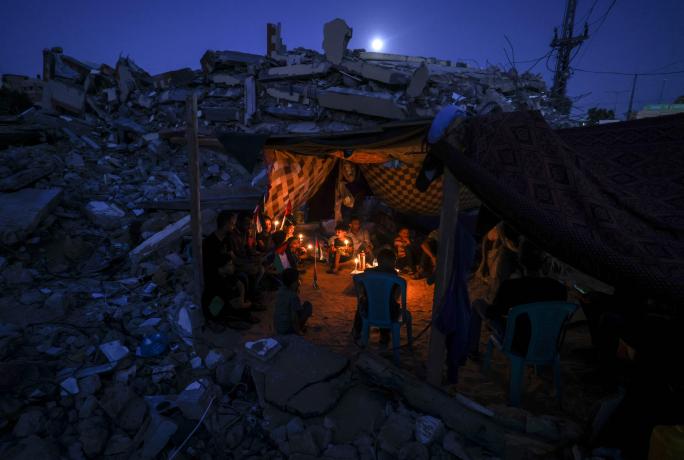By Michael Lynk and Ketty Nivyabandi
Once again, missiles and rockets flew between Israel and Gaza. When the ceasefire was finally declared on Thursday, at least 242 Palestinians – including at least 66 children – in Gaza had been killed, along with 10 Israelis, including two children. At least 14 Palestinians in the West Bank protesting the violence in Gaza were killed by Israeli security forces. Gaza suffered immense property destruction. And 75,000 Palestinians were forced to seek shelter in UN schools and other locations to escape the missiles.
As international human rights observers, we believe that the firing by Israel of missiles and shells into heavily populated areas of Gaza, its dreadful toll on civilians, property destruction and bombing of international media offices constitute war crimes. We also believe that the firing of rockets by Palestinian armed groups into Israeli urban areas violates international law. These actions must be investigated by the International Criminal Court.
The international community’s utter failure to reach an immediate ceasefire is inexcusable. During the 11 day violence, the United Nations Security Council failed to agree on a common statement after four meetings – let alone to adopt a binding resolution demanding an immediate cessation of hostilities by the parties – betraying the current limits and inequity of our international rules-based order.
But more crucially, we are appalled by the Security Council’s refusal to address the root causes of this latest bloodshed.
The underlying reality of the Gaza violence and the demonstrations in East Jerusalem against the forced evictions of Palestinian inhabitants from their homes is that of a deeply unequal struggle: 54 years of occupation by one of the best equipped militaries in the world, ruling over a people who have the right to end a protracted and illegal alien rule. There can be no just and durable solution to the Israeli-Palestinian conflict without recognition of this fundamental fact.
The latest attacks are eerily familiar to the previous wars in Gaza in 2008, 2012, 2014 and 2018. Israel’s far superior firepower is inflicting far higher death tolls and injuries and a much larger scale of property destruction upon Gaza.
Much of the culpability for this failure rests with the United States. This past week, it has repeatedly blocked a statement agreed upon by the other 14 members of the Council. Since 1973, the US has vetoed 31 resolutions critical of Israel at the Security Council, resulting in a perpetual paralysis at the world’s most important political body.
As Barack Obama acknowledged in his recent memoirs: “Our diplomats found themselves in the awkward position of having to defend Israel for actions that we ourselves opposed. U.S. officials also had to explain why it wasn’t hypocritical for us to press countries like China or Iran on their human rights records while showing little concern for the rights of Palestinians.”
Canada’s diplomatic laryngitis on this issue is just as startling. Canada’s statements during the Gaza violence offer no direct criticism of Israel and made no mention of the occupation. Canada holds one of the weakest voting records on the Israeli occupation at the UN General Assembly, which contributed to its failed bid for a seat on the UN Security Council.
This exceptionalism towards Israel violates the universal essence of human rights. The two million Palestinians living in Gaza have been closed off from the outside world by Israel’s comprehensive 14-year land, sea and air blockade which has resulted in a 45 percent unemployment rate, among the world’s highest.
Gaza’s sole source of drinking water – an underground aquifer – is almost completely undrinkable. Its inhabitants have power for only six to ten hours daily.
Most alarmingly, Gaza’s health care system is flat on its back. During the blockade, it has been starved of equipment, medicines, and trained staff. It was already collapsing under the ravages of the Covid-19 pandemic. Now, it is struggling to treat the almost 2,000 Palestinians injured during this latest violence.
Two recent Secretaries General of the United Nations described the Israeli blockade as collective punishment against the Palestinians in Gaza, a grave breach of the Fourth Geneva Convention, the primary source of international humanitarian law. Gaza is a unique human rights crisis in modern history. Where else in the world are so many people under occupation penned up in what has been called an open-air prison?
More importantly, when will Canada have the diplomatic courage to hold Israel accountable for its occupation and its resulting cycle of violence?
The only path to secure a just and durable peace between Israelis and Palestinians is not realpolitik, but a rights-based approach which addresses the illegal occupation of Palestinian Territories.
Michael Lynk is the United Nations Special Rapporteur on the situation of human rights in the Palestinian Territory occupied since 1967
Ketty Nivyabandi is the Secretary General for Amnesty International Canada (English Section)
This article originally appeared in the Hill Times.





















